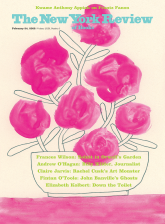In response to:
Arias in the Archive from the November 18, 2021 issue
To the Editors:
One should have had reason to rejoice that Yuri Slezkine reviewed Maria Stepanova’s In Memory of Memory [NYR, November 18, 2021]. He is a historian whose work includes The House of Government: A Saga of the Russian Revolution (2017), a masterful account of those who lived in the building made famous by Yuri Trifonov’s novel The House on the Embankment. He draws sensitively on Trifonov’s fiction as well as on a vast body of historical material.
So we expected a review alert to the ways in which Stepanova’s text crafts a framework for writing about the past, a review that adeptly described the new aesthetic language in which Stepanova builds her account of the twentieth century. But Slezkine surprisingly flattens this complex narrative almost beyond recognition. He ignores In Memory of Memory’s most interesting features, including its roughened narrative surface and patchwork of verbal material. One would not guess from his review that this huge book includes letters and diary excerpts from the family archive; descriptions of photographs and film sequences; long stretches of travelogue and picaresque; streaks of bildungsroman as the narrator learns and matures in the process of writing about her family; and extensive essays on literature and memory.
Most important, one does not learn that the book uses an elusive, shifting “I” that can hardly be taken as a singular, direct authorial voice. Thanks to Sasha Dugdale’s finely tuned translation (itself deserving of comment from an expert reviewer), Stepanova’s brilliance as a stylist, her virtuosity in using different genres and different authorial personas, and her self-ironic, doubting voice come through in eloquent and poetic English.
And Stepanova is a poet, a great poet, in fact, but you’d never guess that from the review. That’s more than a missed opportunity, because her poetry explores the limits and lures of a lyric self and implicitly teaches us how to read In Memory of Memory. Slezkine’s concluding sentence, with its snide comment about Stepanova’s book mostly taking selfies, deeply misrepresents it—the work of a poet who has long channeled the stories of others.
Linking her poetry to In Memory of Memory remains to be done, but English-language readers can begin to do so for themselves by seeking out two new translations of her work, The Voice Over (which includes poetry and essays) and War of the Beasts and the Animals. The title poem of the latter along with its companion poem “Spolia” take up the violence and falsifications of Russia’s past and the current war in Ukraine, bringing Stepanova’s acute political insights about the uses and abuses of historical memory to bear on the unthinkable present.
Irina Paperno
Professor Emerita
Slavic Languages and Literatures Professor
Graduate School
University of California at Berkeley
Stephanie Sandler
Ernest E. Monrad Professor
Slavic Languages and Literatures
Harvard University
Cambridge, Massachusetts
Irina Shevelenko
Professor of Russian
University of Wisconsin at Madison
Yuri Slezkine replies:
It is true that Stepanova’s brilliance as a stylist comes through in eloquent and poetic English. But it is also true that she has some earnest points to make, and that she makes them forcefully and repeatedly. The past is unreachable, memory is unreliable, the dead are vulnerable, and the living are traumatized. The assorted fragments from Stepanova’s family archive are held hostage to the dismal proposition (portrayed as a gradual realization) that the only way to write about the past is to offer a series of reflections about one’s inability and moral unfitness to do so. The fact that Stepanova routinely represents some traumas and histories as more authentic than others escapes the book’s “self-ironic” scrutiny.
The authors of the letter are not troubled by the mismatch between Stepanova’s radical epistemological skepticism and her middle-of-the-road moralizing. The narrator’s “shifting ‘I,’” they suggest, is elusive enough to allow for a certain amount of intellectual incoherence. Stepanova’s arguments, no matter how persistently and single-mindedly made, should not be taken at face value. In the presence of so much stylistic virtuosity, who cares what goes on beneath the “roughened narrative surface and patchwork of verbal material”?
They promise more of the same in Stepanova’s poetry. The author who believes that historical reconstruction is both impossible and illegitimate can be counted on to defend Russia’s past from “falsifications.” The mind irreparably traumatized by the death of memory (or so Stepanova tells us, perhaps with a wink) is capable of issuing “acute political insights about the uses and abuses of historical memory.” The poet who has despaired of deciphering the unthinkable past will bring her skills to bear on “the unthinkable present.”
My own preference is for the thinkable over the unthinkable, but I agree that readers who seek out Stepanova’s English translations are likely to be impressed by her—and her translators’—extraordinary patchwork of verbal material. Just don’t expect acute political insights.
This Issue
February 24, 2022
Liberation Psychology
‘Invitations to Dig Deeper’
Riffraff



